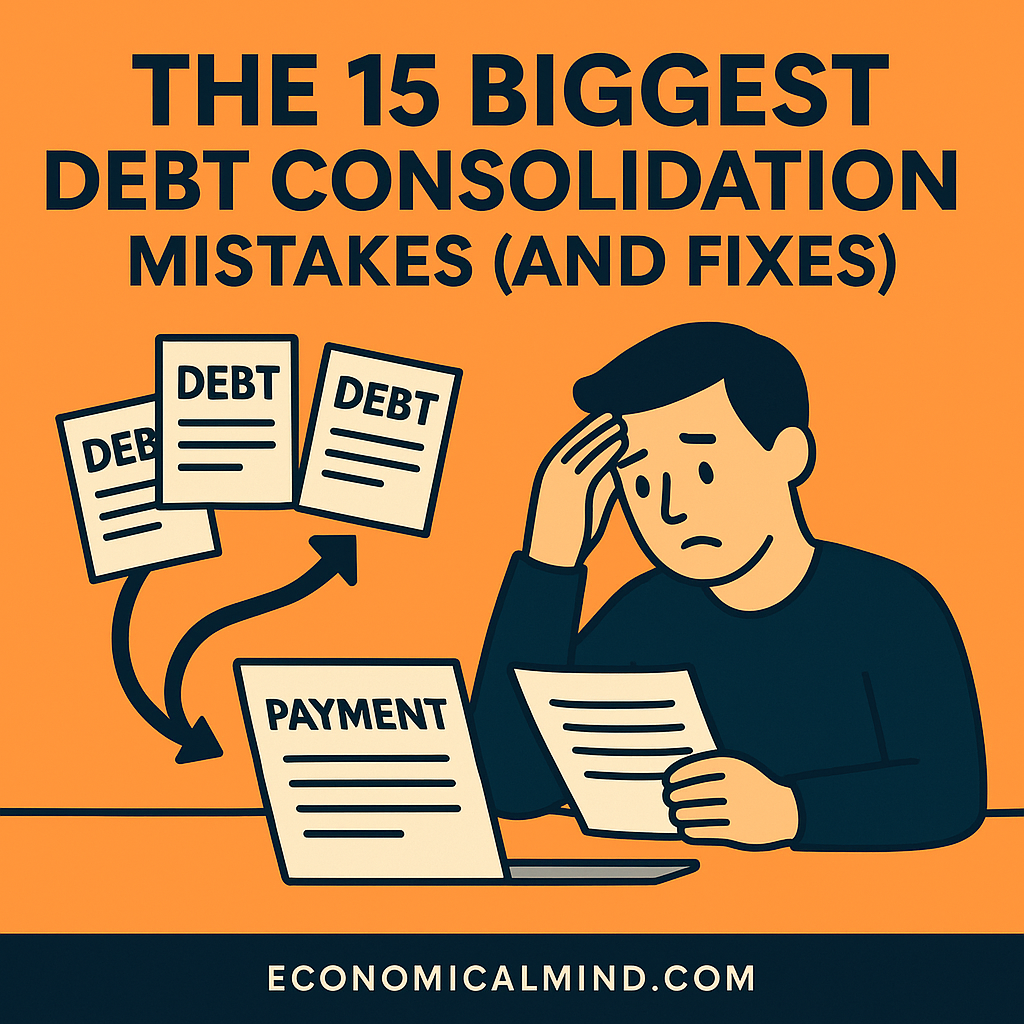
Debt consolidation can simplify your finances and lower your stress — but only if you avoid the common traps that turn a smart move into a costly setback. Before combining your debts, make sure you understand these pitfalls and how to fix them.
1. Consolidating Without a Plan
Many people jump into consolidation just to “feel better” about their payments, without solving the underlying problem.
Fix: Create a realistic repayment plan before consolidating so you don’t repeat the same cycle.
2. Ignoring the Interest Rate Math
If your new loan’s interest rate isn’t actually lower, you’re not saving anything.
Fix: Compare your current weighted average interest rate to the consolidation offer before signing.
3. Stretching Out the Term Too Long
Lower monthly payments can be tempting, but longer terms often mean paying more in interest overall.
Fix: Choose the shortest term you can afford to minimize total interest costs.
4. Forgetting About Fees
Balance transfer fees, origination fees, or early payoff penalties can quietly eat into your savings.
Fix: Read all the fine print — if the fees outweigh the benefits, it’s not worth it.
5. Closing Old Credit Accounts
After consolidating, some people close their old credit cards to “start fresh.” This can hurt your credit score.
Fix: Keep older accounts open (but unused) to maintain your credit history and utilization ratio.
6. Ignoring Credit Score Impact
Hard inquiries and new accounts can temporarily lower your credit score.
Fix: Apply for only one consolidation option and avoid multiple applications at once.
7. Consolidating the Wrong Debts
Not all debts are ideal for consolidation — for example, student loans may lose protections if refinanced privately.
Fix: Consolidate only high-interest, unsecured debts like credit cards or personal loans.
8. Not Fixing Spending Habits
Consolidation doesn’t solve overspending. Without discipline, you’ll end up with new debt.
Fix: Adjust your budget before consolidating to prevent future debt buildup.
9. Using Home Equity Without Caution
Tapping home equity to pay off credit cards can put your house at risk if you can’t repay.
Fix: Only use secured options like HELOCs if you have stable income and a clear repayment plan.
10. Falling for Scams
Some debt consolidation companies charge high upfront fees or make unrealistic promises.
Fix: Use reputable lenders or nonprofit credit counseling agencies.
11. Missing a Payment After Consolidation
Even one missed payment on your new loan can hurt your credit and increase rates.
Fix: Set up automatic payments to stay on track.
12. Not Comparing Lenders
Rates and terms vary widely. Sticking with the first offer may cost you more.
Fix: Get quotes from at least three lenders before committing.
13. Forgetting About Tax Implications
Forgiven or settled debt can sometimes be taxable.
Fix: Check with a tax professional before finalizing a debt consolidation or settlement plan.
14. Expecting It to Fix Everything Overnight
Consolidation simplifies payments, but it doesn’t erase debt or fix habits instantly.
Fix: Be patient — it’s a step toward progress, not an instant cure.
15. Not Reviewing Progress
Some people consolidate, then never check if their strategy is working.
Fix: Review your loan balance and spending habits quarterly to make sure you’re staying on track.
Key Takeaway
Debt consolidation can be a powerful tool when done strategically. Avoid these 15 mistakes, and you’ll transform it from a quick fix into a real long-term solution for financial stability.
